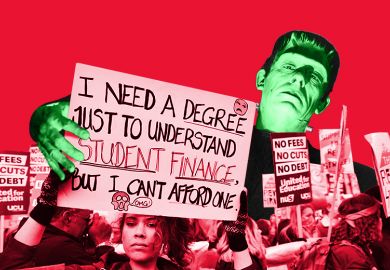The Westminster government appears to be on course to reduce the repayment threshold for English student loans, raising fears that it could hit lower-earning graduates the hardest.
According to an article in the Financial Times, the government is considering lowering the salary threshold at which graduates start repaying their tuition fee loans from the current figure of £27,295. “That’s the plan,” one minister reportedly told the newspaper.
Changes to the loan system are expected to form part of the Westminster government’s response to the Augar review of post-18 education financing in England, which recommended that the threshold should be reduced to £23,000. This could save the Treasury £2 billion a year, it has been estimated, with a decision expected to form part of the comprehensive spending review next month.
According to the FT, ministers have said that reducing the threshold to £20,000 – as suggested in a recent report from the Higher Education Policy Institute – would be “too low”.
According to the Hepi report, such a change would result in many more graduates repaying some or all of their loan and could cut the public cost of loans by almost £4 billion for one cohort.
Under the current system, 44 per cent of the value of student loans taken out by this autumn’s freshers will ultimately be paid by taxpayers, as under current terms outstanding balances are written off after 30 years, and four out of five borrowers never pay back their debt in full.
Earlier this month, Times Higher Education reported that the government was considering proposals set out by a thinktank that would “encourage students to seek out the courses and institutions that will offer them the greatest value” by lowering the repayment threshold.
Under the EDSK proposals there would be a “tiered” system of repayment rates, based on graduate earnings.
However, opposition to any reduction in the salary repayment threshold is already growing. According to a recent report from the Institute of Fiscal Studies it is “essentially impossible” to reform England’s student loans system without hitting average earners harder than the most highly paid graduates.
Hillary Gyebi-Ababio, the National Union of Student’s vice-president for higher education, said the union was “totally opposed” to the plans.
“Like the government’s decision to increase National Insurance contributions, this burden targets people earning lower incomes – after eighteen months of such hardship, and with the looming hike in energy prices set to hit millions of the most vulnerable this winter, the injustice is simply astounding,” she said. “The government must re-envision education, and begin to view it as a right for all, not a product that can be bought and sold for individual gain.”
Henry Parkes, a senior economist at the Institute for Public Policy Research, told the FT that lowering the threshold would be “virtually indistinguishable from a tax rise targeted at young workers alone”.
The University and College Union has already stated that threshold changes that hit “the least affluent hardest” would be “particularly regressive”.
Register to continue
Why register?
- Registration is free and only takes a moment
- Once registered, you can read 3 articles a month
- Sign up for our newsletter
Subscribe
Or subscribe for unlimited access to:
- Unlimited access to news, views, insights & reviews
- Digital editions
- Digital access to THE’s university and college rankings analysis
Already registered or a current subscriber?








